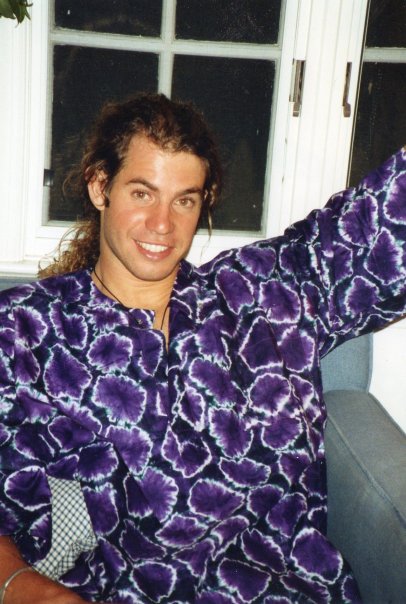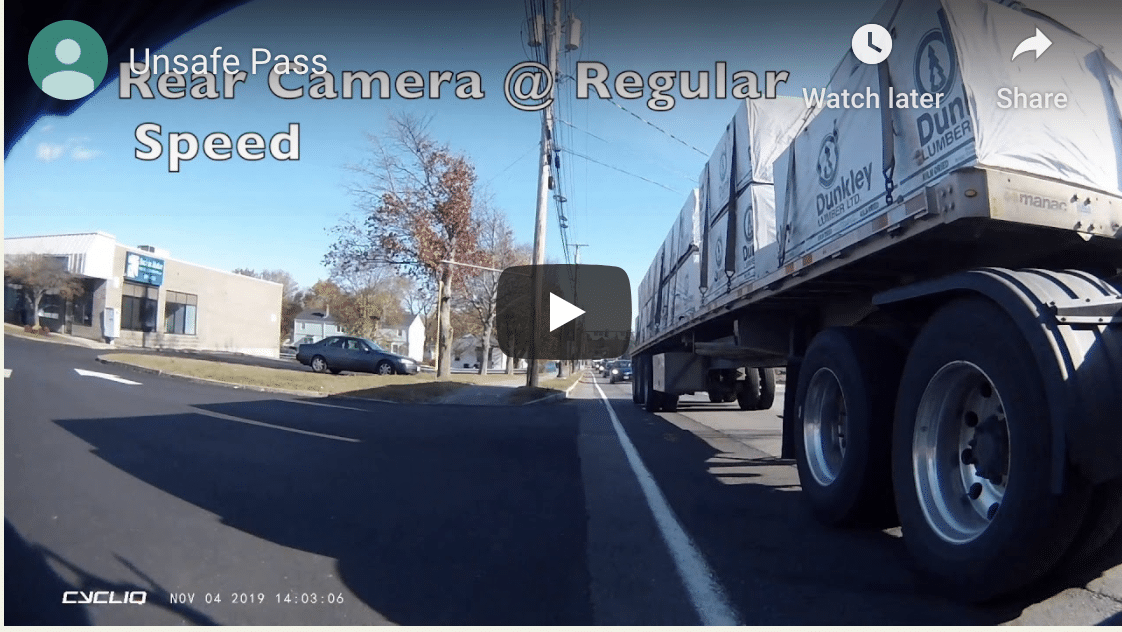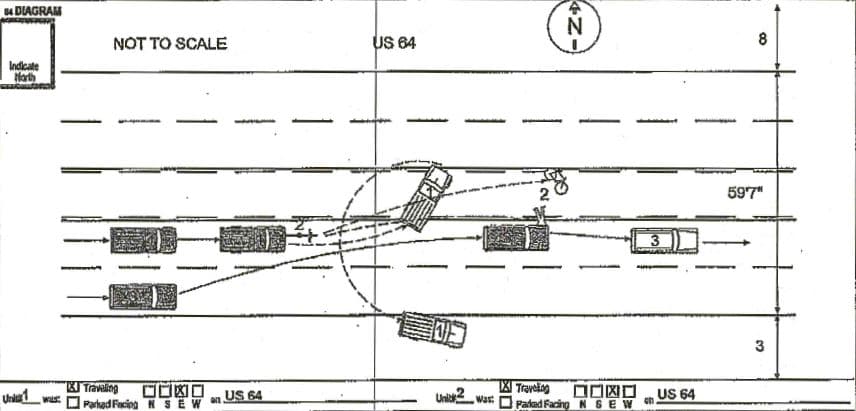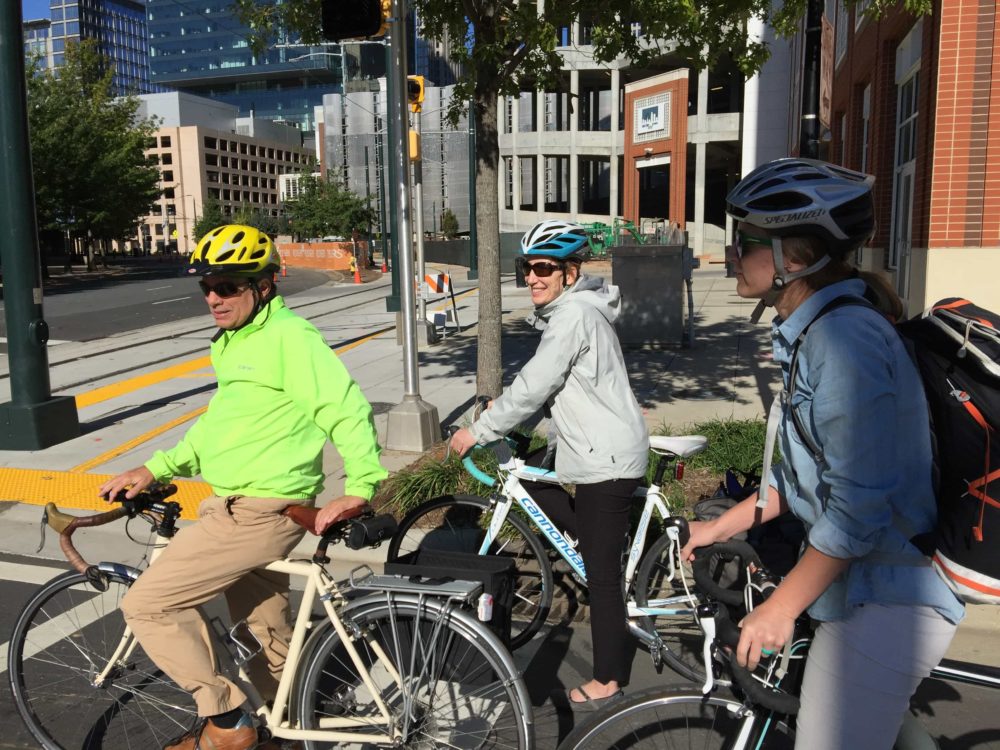
Charlotte has an active bicycling population and is also the location of North Carolina BikeLaw co-founder Ann Groninger. Nicknamed the "Queen City," Charlotte is North Carolina’s largest metropolitan area. The city had a 2014 population of 809,958 people.
Local bicycling advocate Pamela Murray says Charlotte “is a great place to cycle.” She adds, “We can ride here 365 days a year. It’s not too hilly, and we have a moderate climate, with a beautiful tree canopy and leafy streets. We’re not too big of a city, and you can cycle comfortably on many of our streets.”
The city is moving forward with a progressive plan to accommodate bicyclists on and off the road. The city has a Bicycle Advisory Committee that reviews bicycle plans and makes recommendations to the City Council and County Commission. Transportation officials have produced a Charlotte Cycling Guide (PDF) and a biking map that make it easier to get around. Charlotte earned a bronze level designation (2008-2012) as a Bicycle Friendly Community from the League of American Bicyclists. That designation was extended to 2012-2016.
“Things have developed incredibly over the last decade,” says Ken Tippette, the Bicycle Program Manager for the City of Charlotte. “In 2003, we had one mile of bike lanes. Now we have about 190 miles of bikeways. That includes bike lanes, off-street pathways, greenways and signed routes. We are diligently working to expand our system and to create a more connected network.”
Bicycling Developments in Charlotte
Among the very latest cycling developments in the Queen City:
- Complete streets. The city has adopted urban street design guidelines, which uses a complete streets approach in accommodating all users, including bicyclists and pedestrians. Charlotte received the 2009 Environmental Protection Agency’s National Award for Smart Growth Achievement for our Urban Street Design Guidelines.
- Painted bike lanes. The city is using green paint on some bike lanes to make all road users aware of potential conflict points. “We are using paint in places where you want there to be a higher awareness of the bike lane,” Tippette says. “For instance, we might paint where you are likely to have more right turns across the bike lane.”
- Bike boxes. A bike box is “a designated area at the head of a traffic lane at a signalized intersection that provides bicyclists with a safe and visible way to get ahead of queuing traffic during the red signal phase,” according to the National Association of City Transportation Officials (NACTO). Charlotte is experimenting with two kinds of bike boxes, Tippette says. “One is the advance stop box, which helps cyclists get to the front of the queue so they get the most green time through the intersection and are positioned away from the turning movements of automobiles,” Tippette says. “The other is the left-turn, two-stage queue box. Those are used to give bicyclists a safe way to make left turns at multi-lane signalized intersections from a right side bike lane.”
- Bike detection at traffic signals. The city is using bicycle-specific detection devices at traffic signals on bike corridors and signed routes. Markings on the pavement let cyclists know where to stop to trigger traffic signals.
- New greenway route for commuters. The Cross Charlotte Trail, currently under development, will create a 26-mile route from Pineville to the Cabarrus County line. “We expect people to use it recreationally, but we also believe it will be transformative as far as being a transportation corridor for cyclists,” says Tippette. “It’s within one-half mile of 80,000 people and 98,000 jobs. We see this as a spine that goes right through the heart of the city and connects major destinations, including UNC-Charlotte, Center City, a couple of hospitals, Central Piedmont Community College, major shopping centers, and major parks, including Freedom Park.”
- Bike routes. Charlotte has installed signs for key bicycle routes to shopping areas, employment centers, transit connections, greenways and parks. The signed routes are located mostly on low-volume, low-speed city streets and streets with bicycle lanes.
Private and Nonprofit Biking Initiatives
Bicycling in Charlotte has gained significant financial support from private and nonprofit sources. The city has a bike share program, Charlotte B-cycle, touted as one of the largest urban bike sharing systems in the Southeast, with 200 bikes and 24 stations in the Uptown area and surrounding neighborhoods. Charlotte Center City Partners offers a map of the Charlotte B-cycle stations and Charlotte bike paths and trails.
In March 2015, the John S. and James L. Knight Foundation announced the $600,000 Charlotte Cycling Fund to create a more bicycle friendly and livable city. According to a Charlotte Observer article, that money will help build on the city’s efforts over the past decade to increase cycling routes and add signs for bike routes and off-road paths.
Bike Rides and Events
Charlotte has a robust Bicycle Benefits program, which offers discounts to bicyclists at participating businesses and restaurants. That effort is headed up by Pamela Murray, who is a Cycling Savvy instructor and the founder of Charlotte Spokes People, the umbrella organization for the Plaza Midwood Tuesday Night Ride, the Sunday Slow Riders and BikeFest.
For information on those and other rides that suit your pace and schedule, look no further than weeklyrides.com, a labor of love by local cyclist Jeff Viscount. The site has a comprehensive list of weekly rides, tours and races.
Annual cycling events include BIKE! Charlotte, 17 days of bicycle-related events and promotions used to encourage families, friends and colleagues to break out the bike and integrate it into their daily routine. For cyclists who want to try bike commuting, Free Wheelin' Fridays is a weekly Friday morning commute from neighborhoods to the Uptown area. It’s part of the Charlotte Bicycle Commuter Mentors program.
Bikes on Transit
The Charlotte Area Transit System (CATS) allows bikes on its buses and trains – and bikes ride for free. CATS buses have bicycle racks located on the front of the bus and can accommodate two bicycles. Bikes are also allowed on the LYNX trains. Each train has four interior bike racks, and bicyclists are allowed to stand with their bikes in some areas.
Many transit stations have bicycle racks or lockers for cyclists who do not need to take their bicycles with them after commuting to the station.
Challenges for Charlotte Area Bicyclists
A significant challenge that cyclists face is Charlotte’s rapid growth and suburban sprawl – an average of 44 new residents move there every day – and that puts pressure on the city’s infrastructure.
“We are a fast growing city, and we have to find a way to accommodate all the new residents, whether it’s by road, greenway, sidewalk or bike way,” Tippette says.
Improving connectivity is also a challenge.
“Charlotte grew up in a time when you had lots of cul de sacs and enclosed neighborhoods,” Tippette says. “Connectivity will give us a smoother flow for biking around Charlotte by helping cyclists find more comfortable streets with low traffic volumes and speeds. But we’re getting better, and it’s easier now to get into Center City than it used to be 10 years ago.”
Tippette adds, “We’ve had good leadership and we’ve recognized that with so much growth headed our way over the next 25 years, we have to have accommodations to get around. And we want to give options to everyone. We believe the automobile should not be the only option. It should include walking, biking, light rail, street car and mass transit. Congestion is going to be a problem for quite some time. So we are asking ourselves what we can do so people don’t have to get in that congestion.”
Things to See And Do While Biking in Charlotte, NC
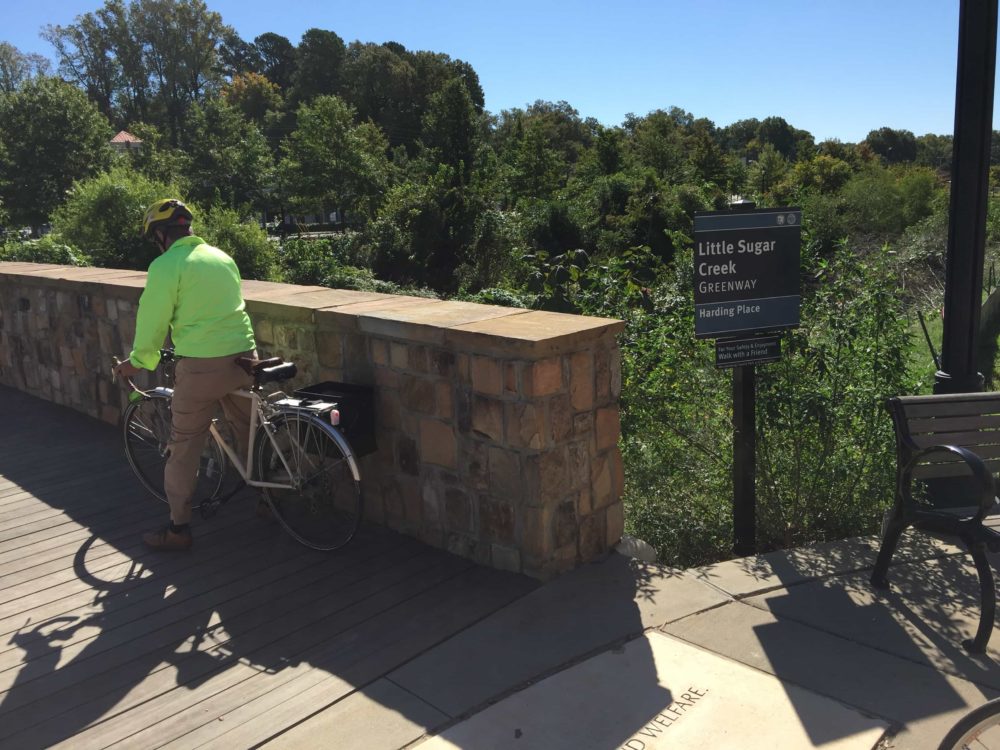
Charlotte bicycle advocate Pamela Murray says Charlotte is a great place to cycle year-round. Following are some of the things that make cycling great in Charlotte.
- Take a Neighborhood Tour -- Plaza-Midwood or NODA. Charlotte’s Plaza-Midwood is one of Charlotte’s most vibrant neighborhoods with a diverse mix of homes, art galleries, small shops and restaurants. Located about one mile northeast of the Uptown area, Plaza-Midwood is the center of several cycling activities and events. The neighborhood is home to many of the city’s numerous Bicycle Benefits businesses, as well as a public bike maintenance stand. Both the business and neighborhood associations are supportive of biking in the area. Another popular neighborhood destination is North Davidson, or NODA, an historic arts district northeast of Uptown. Between visits to various NODA shops and galleries, you can enjoy coffee at the Smelly Cat, tacos at Cabo or a cold beverage at one of several breweries in the district.
- Join a neighborhood ride. Speaking of Plaza-Midwood, the neighborhood is the start location for the Plaza Midwood Tuesday Night Ride (PMTNR), which meets every Tuesday at 7:30 p.m. The Tuesday event can draw as many as 100 riders. You can also check out the Sunday Slow Riders, “a group of bicyclists of all ages and abilities who gather to take a chill ride all over town.”
- Check out the painted bike lanes and bike boxes. Charlotte is keeping pace with the latest developments in bike facilities and infrastructure. Bike around the Uptown area and you’ll see several green bike lanes, including one on Fourth Street near College. You’ll also find bike detection markings at several intersection that let you know where to stop to trigger the traffic signal. Also look for a bike box at the Carson and South Boulevard intersection.
- Follow that greenway! The City of Charlotte is partnering with Mecklenburg County to create a 26-mile trail and greenway facility, the Cross Charlotte Trail. Several sections are complete and others should be finished soon. When completed, residents will be able to travel continuously from one end of Charlotte to the other, starting in the city of Pineville, through Uptown and on to the UNC-Charlotte campus before ending at the Cabarrus County line. About 98,000 jobs and 80,000 residents are located within a half mile of the proposed trail, which will connect to dozens of treasured sights, parks and major employment centers. Cyclists also have the option of many other greenways.
- Check out the Booty Loop. Chances are you’ve heard of the “24 Hours of Booty” event held annually in Charlotte as a fundraiser for several organization that help cancer victims, including the Levine Cancer Institute, LIVESTRONG Foundation, Keep Pounding Foundation, WindRiver Cancer Wellness Retreats and the Brain Tumor Fund of the Carolinas. The 3-mile Booty Loop runs through Myers Park Neighborhood and is popular with the cyclists and joggers.
- Join a bike & brew ride. The Olde Mecklenburg Brewery (OMB) is one of several microbreweries in town and host to one of the oldest bike rides, Sunday’s “Bike Up,” a 1.5 hour cruise at a 17-20 mph average speed. You’ll need a cold beverage after 90 minutes at that pace.
- Signed Bike Routes. If you want to explore Charlotte’s many other leafy residential neighborhoods, consider following one of the signed bike routes established by city transportation planners. I highly recommend Bike Route 9 for commuting from south Charlotte to the Uptown area. The route stays mostly on quiet residential roads, many with traffic calming features.
- Express your freedom in Freedom Park. For a family bike outing, consider a trip to Freedom Park, a 98-acre open space just south of downtown, between the Dilworth and Myers Park neighborhood. It can be reached on the bike-friendly Little Sugar Creek Greenway. You’ll find baseball and soccer fields, a basketball court, outdoor shelters with grills, a concession stand, a lake and two playgrounds.
Legal Help for Charlotte Bicyclists
Bike Law is national network of independent lawyers and law firms dedicated to helping cyclists injured in bicycle accidents. We are cyclists ourselves and we care deeply about the cyclists in the cities and towns where we live and ride. North Carolina Bike Law attorney Ann Groninger, with a Charlotte law office, is an active cyclocross rider. Ann provides legal help to injured Charlotte bicyclists in dealing with the police and auto insurance companies, and she handles cases in civil and criminal courts in Charlotte and Mecklenburg County. Please contact us for help with your case.
Reviews
Review By Levi Nelson
Personal, Realistic and Always Looking For My Best Interest.
Last year I was hit by a drunk driver while on my bicycle sustaining severe injuries. I turned to Bike Law to represent me. From the beginning they were very personable, realistic and were always looking out for my best interest. Throughout the whole process they kept me well informed and were accessible when needed. This allowed me to focus on my recovery.
Rating: ★★★★★ 5 / 5 stars
If you would like Bike Law to come speak to your club or at your shop, please contact us.



